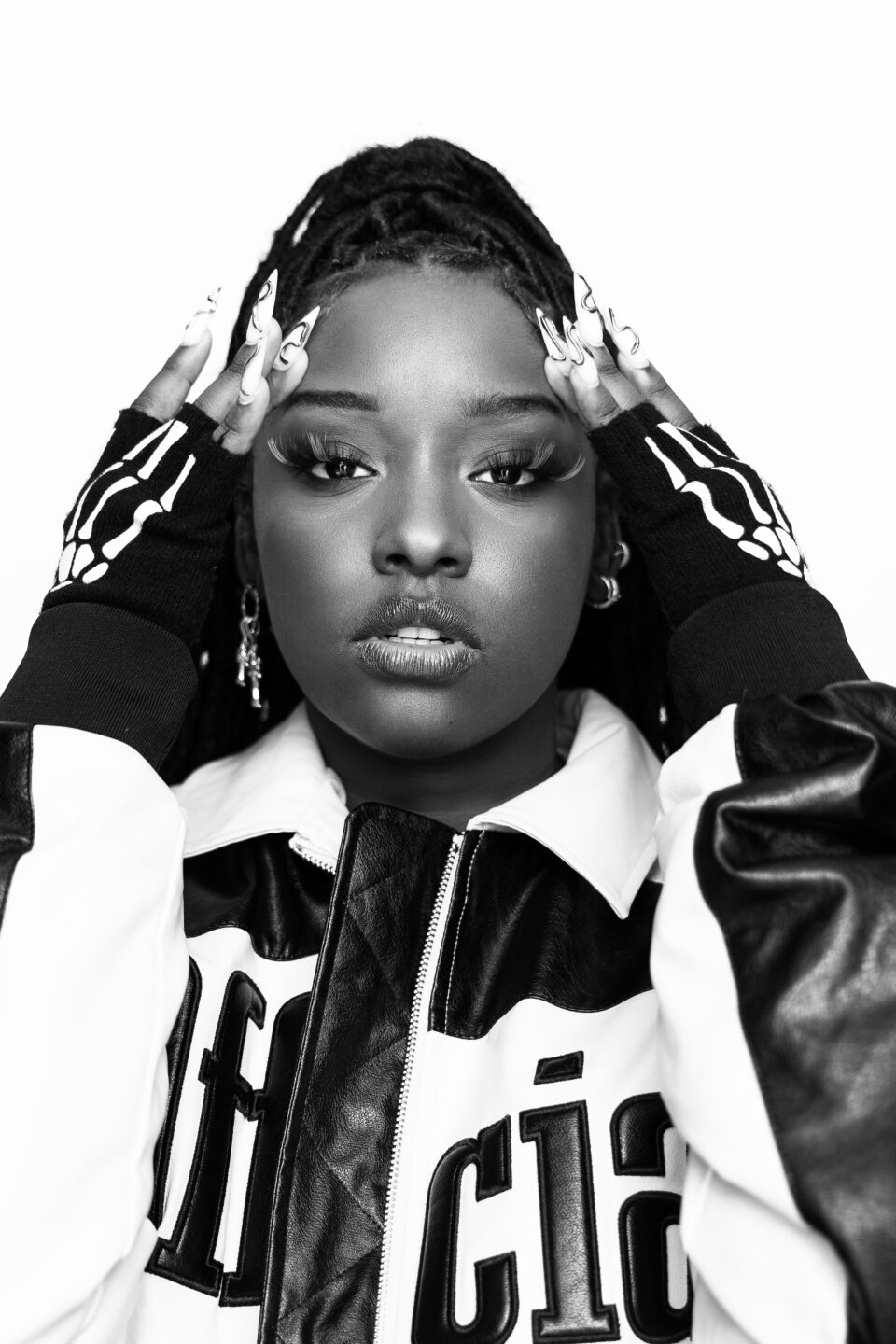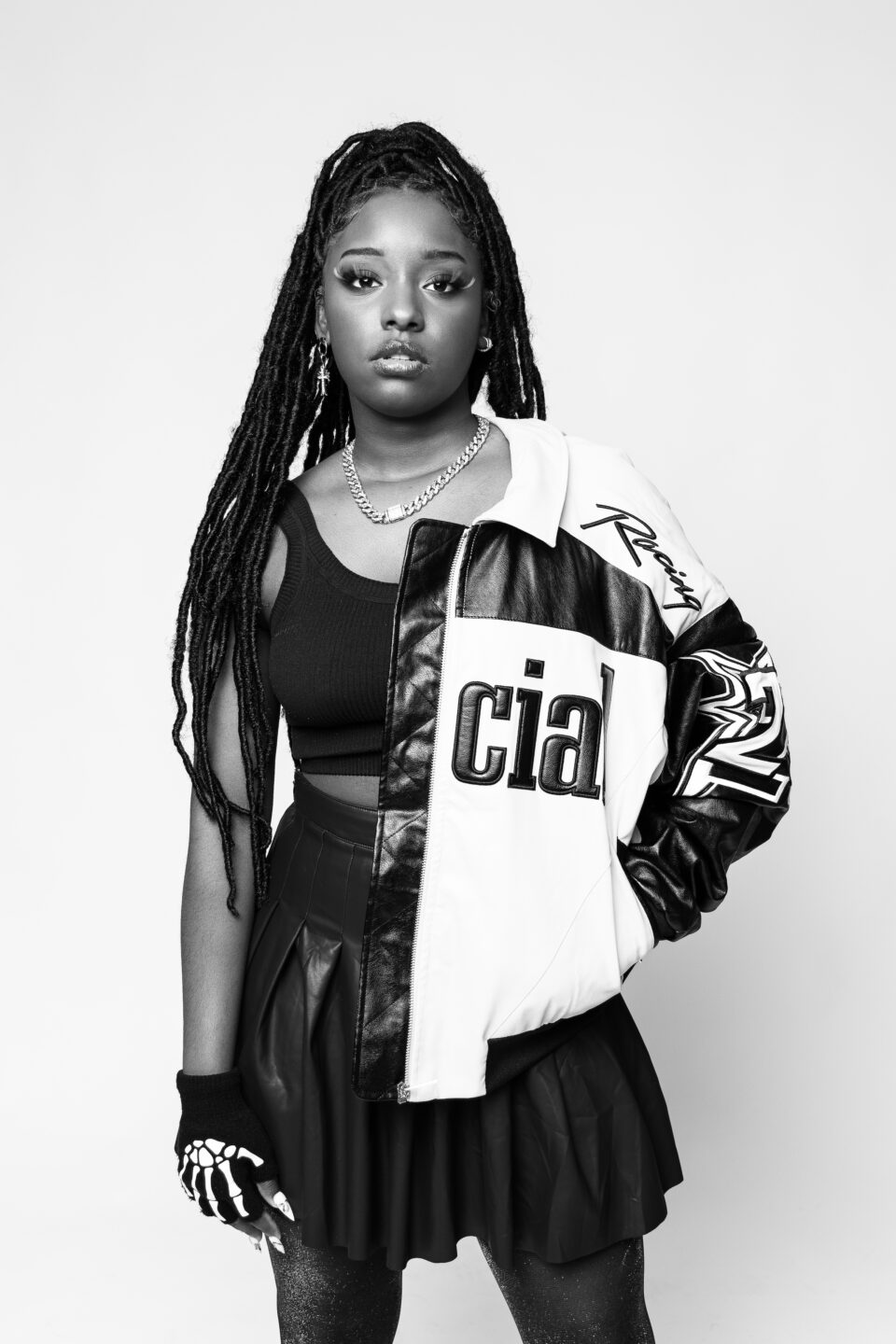BACKSTORY: A dynamic new voice on the hardcore hip-hop scene, the 18-year-old rapper first turned heads after dropping a freestyle that made her a viral success
FROM: San Cristóbal, Dominican Republic
YOU MIGHT KNOW HER FROM: Her Latin GRAMMY–nominated 2023 single “Autodidacta,” the EP of the same name it appeared on, or her Tiny Desk concert
NOW: After signing with Sony, J Noa is constructing her debut full-length and appearing at FLOOD’s SXSW showcase
At just 18 years old, Nohelys Jimenez—a.k.a. J Noa—earned a Latin GRAMMY nom for her 2023 single “Autodidacta” and a Premio Lo Nuestro for Breakthrough Female Artist—feats that seemed near impossible for the Afro-Dominican artist from the barrio of San Cristóbal and the daughter of a single mother. Not for J Noa, of course, who defiantly laughs in the face of impossibility. Now, she has her sights set on her upcoming 2024 SXSW appearance and on her follow-up to the EP of the same name that the aforementioned hit single appeared on.
“I taught myself everything I know,” Jimenez tells me in her native Spanish over Zoom, reiterating the focal point of Autodidacta while dressed in black and sitting in front of various instruments and equipment typically found in a music studio. Even though she’s young, she has the presence of an old soul and a certain enigmatic aura. She divulges that she regularly travels between Miami and the Dominican Republic to record and write her music, as she’s constantly working. Her lyricism, though, is more akin to a jazz musician than a typical rap cipher. And it only takes a little examination to see why.



J Noa’s effortless bars jump from subject to subject, and that’s by design. She doesn't like to stick to one theme or repeat herself. “It all depends on the project,” says Jimenez. “I rap about politics in the song ‘Que Fue,’ and in ‘Betty’ I rap about teenage pregnancy—but I keep to the theme I explore in one song, so every song I write is different.” Her music is a testament to that ethos, as you can find tracks on her EP tackling different ideas and topics, such as government oppression, misogyny, mental health, and drug addiction. Her MO when creating art is her lived experience as a minority and woman in the Dominican Republic and the impromptu inspiration she channels from listening to the beats provided by the producer she works with.
Much like her lyricism, the beats she raps over don’t stick to one style and can be unconventional at times, jumping from reggaeton-infused to gangsta-funk while remaining wholly unique. Although much of her work is undeniably Dominican, she doesn't shy away from outside influences, unabashedly proclaiming over familiar G-funk production in her single “Spicy” that the only rappers who can hang with her are Biggie and Tupac. You’d be hard-pressed to disagree, as her flow tends to pivot from slow and suave to lightning fast, as evidenced in her impressive freestyle with DJ Scuff.
“I was inspired by the local artists around me. I didn’t really have any outside influences other than what I saw, but my style has always been my own.”

Her impeccable flow was hard-earned from the school of hard knocks: her barrio. There, on the streets of her San Cristóbal neighborhood, she developed her technique after she was awestruck by the local boys who would rap out on the streets, driving her to pick up the art at just eight years old. “I was inspired by the local artists around me,” says Jimenez. “I learned what I do from them. I didn’t really have any outside influences other than what I saw, but my style has always been my own.”
And she’s right. Her flow is totally insular—it’s hard to pin her sound down because she doesn’t sound like anyone else. Despite being averse to comparisons within her genre, she’s a fan of musicians outside the confines of hip-hop, favoring unconventional Latin-pop superstars Karol G and Rosalía, looking to both artists and their unique career trajectories and lyricism as inspiration.
A bonafide rap veterana and self-made prodigy, her success is something she doesn’t take lightly. She understands her privileged position and gives back to the community that gave her so much, working with the Puerto Rican–based charity Hogar Crea, a nonprofit that helps those who battle drug addiction. “I try to help and work with charities when possible,” says Jimenez. “I think it’s important to give back, especially since there aren’t many resources for people [in the Dominican Republic] who struggle with poverty and mental illness.” It’s a community commitment she takes seriously, living up to the values of her art by applying them to her life.
After blowing up as a rapper, signing with Sony, and earning her first Latin GRAMMY nom, Jimenez now has her sights set on Austin to show the world what she’s truly capable of. She’s already ticked a coveted Tiny Desk performance off her bucket list, working with an arranger to bring her songs to life with a live band. It was a magnificent experience that she hopes to match at SXSW in Austin, performing there for the first time in her career—including a set at our very own FLOODfest party. “I’m in several showcases,” says Jimenez. “I’m performing with a few other artists at Rolling Stone’s showcase, I think, with Peso Pluma, Young Miko, and others. I’ve never been there, so I’m looking forward to going to Austin for the first time.”
It’s not easy predicting the future—not that J Noa needs to see the future to keep doing what she’s doing. The odds are with her as she has much more to give, as she’s already working on her follow-up (she’s tight-lipped about upcoming music other than hinting that it’s coming). If it’s anything like her past work, it’s probably worth the wait. FL








